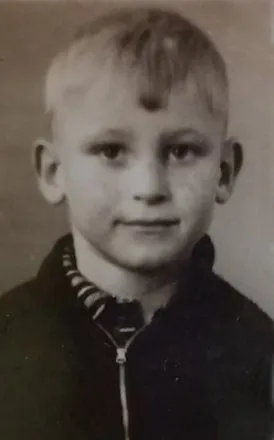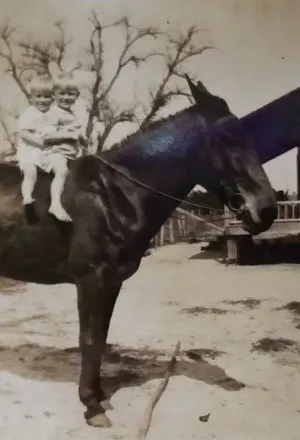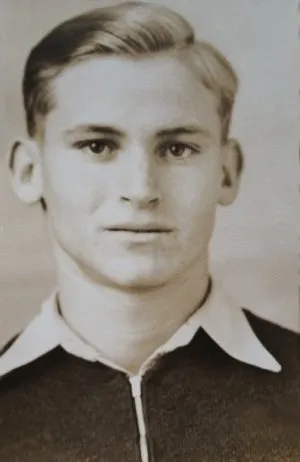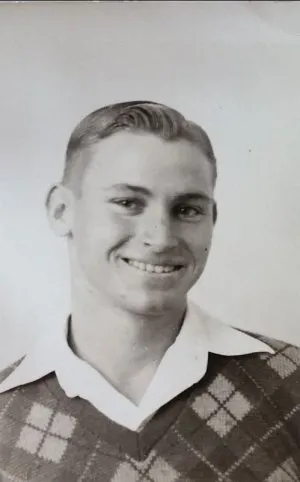He was born in 1931, during the time of the Great Depression, and lived through it until the economy recovered when he was 10 years old. He remembered the careful living that was required of most families for survival. Back in those days, children had to REALLY pull their weight in chores — not just "cleaning their room" like kids today — and he did a lot of work around the homestead with his brothers and sisters.
My father had a twin brother, and they were born only 15 minutes apart. They looked so much alike that many people had trouble telling them apart, but they were well-behaved for the most part and didn't pull many identity pranks. I clearly remember attending family reunions as a child and having cousins ask me, "Is that your Dad, or your uncle, over there?" because they could not always decide on their own. But, my brother and I never had a problem, nor did the children of my father's twin.
 |
 |
|---|---|
my father during |
my father and his twin brother |
The town where my father was raised was a small town — the population was about 400 during his childhood, according to census records I've seen. He was enlisted to walk a few blocks to the school at 6:00 in the morning to shovel coal into the boiler so the school would be warm when classes began a couple of hours later. He would then walk back home, have breakfast and do chores until time to return to school. I seem to remember his saying that he also stoked the boiler at the local church on Sunday mornings, in similar fashion.
my father (r) and his twin brother (l)
When he graduated high school, my father went to work driving a vehicle that served as an ambulance for a local funeral home. Yes, ambulance services were often operated by funeral homes back in that day, at least in the very small towns in the US. Sometimes, he would transport people to hospitals, and sometimes he would retrieve bodies for the funeral home.
 |
 |
|---|---|
my father during |
my father circa |
For his military service, my father was sent to Germany, to participate in The Marshall Plan, which was rebuilding war-torn Europe after World War II. He served in the Headquarters Company of the 315th Signal Corps Construction Battalion. Their primary objective was facilitating communications, and a large portion of that task involved stringing telephone and telegraph wires across the country. My Dad's job was part of the supplies requisition and delivery team. While he was serving in Germany, he had a few days of leave and decided to rent a motorcycle and ride through the Swiss Alps.
When he returned home from military service, he decided to buy a car from the money he saved. He became frustrated with the run-around and pricing the local dealership was giving him. My grandfather worked as a Station Agent for Southern Railway, and received discount priviledges on travel. So, they bought one-way train tickets to Detroit, traveled there together, and bought a vehicle from a dealership near the factory for a fraction of what the dealership near his home was charging AND was treated better, too! My father and grandfather drove the Plymouth Cranbrook on a roundabout route home, stopping off at Niagara Falls, visited family in Rhode Island, came back through New York City, then stopped to visit more family in Virginia before returning home to Georgia.
He got a job as an Apprentice Tool and Die Maker with a local company that fabricated automobile parts.
My father met my mother through a mutual-friend of both families, and married her a year later. He always told me that the second he laid eyes on her, he knew she was "the one" for him. Throughout their 61+ years of marriage, they remained devoted and faithful to each other, through thick and thin. He told her frequently that he loved her, and always maintained that she was as beautiful to him as the day he married her.
my parents, circa the time of their marriage
As a faithful member of a church all his life, he served in a wide variety of capacities over the years from Usher to Sunday School Superintendent to Chairman of the Administrative Board. Many people have expressed respect and appreciation for the heartfelt, unpretentious way in which he prayed, when asked to offer a prayer after Sunday School and on other occasions.
Even though he was never a member of the choir, he had a beautiful voice and sang joyfully from his usual spot among the pews with other churchgoers. On lazy Sunday afternoons, he would take the family on ambling car rides through the mountains and countryside, often engaging everyone in the car to sing along with him.
He inherited his father's skills with woodworking. He built the house that was our family's first home, doing all the work with his father and two brothers assisting. He built birdhouses to cater to Mom's interest in birds (which became one of her primary fascinations during Empty Nest Syndrome days), plus numerous step-stools, storage boxes, cabinets for the kitchen and laundry room in the present home, as well as the tool shop and storage buildings that are behind the home.
After he put my brother and myself through college, he continued to scrimp and save money so that he and my mother could survive after his retirement. There was enough for them to take a few trips before he began to lose his eyesight, which left him almost totally blind. Many of these trips were to different locations where Mom could indulge her hobby of bird-watching.
I served as caregiver to my father during his last years of life, helping him to be as independent as possible. I might share more details of that in a later post. But, I count myself fortunate to have been able to spend quality time with him in his final years and hear the stories he had to tell — some retold from earlier times, but some had never been told to me previously. What a treasure!

